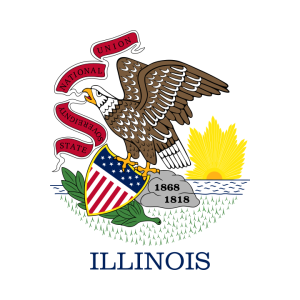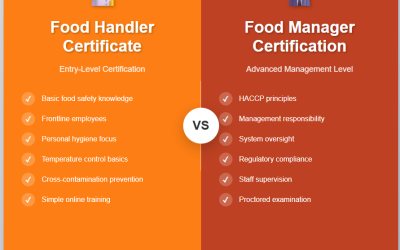Food safety is a cornerstone of public health, particularly in the food service industry, where improper handling can lead to widespread foodborne illnesses. The ANSI National Accreditation Board (ANAB), a wholly owned subsidiary of the American National Standards Institute (ANSI), ensures high-quality food handler training through accreditation based on the ANSI/ASTM E2659-18 standard. This article explores the role of ANAB accreditation, the specifics of the ANSI/ASTM E2659-18 standard, its application in food handler training, and its significance.
Overview of ANAB Accreditation
ANAB, established as a nonprofit subsidiary of ANSI in 2019, accredits certificate programs, including those for food handlers, to ensure they meet rigorous national standards. According to anab.org, ANAB’s accreditation evaluates the quality and competence of training programs, ensuring they prepare food handlers to implement safe practices. The transition from “ANSI-accredited” to “ANAB-accredited” reflects this organizational shift, with all accredited programs required to adopt the ANAB logo by 2025. The ANSI/ASTM E2659-18 standard is the primary framework for these accreditations, ensuring consistency and reliability in food safety training.
The ANSI/ASTM E2659-18 Standard
The ANSI/ASTM E2659-18, titled Standard Practice for Certificate Programs, is a comprehensive standard developed by ASTM International and adopted by ANSI. As detailed on astm.org, it provides a framework for designing and administering certificate programs, ensuring they are credible, transparent, and effective. Key requirements include:
- Program Design: Training must be structured to achieve specific learning outcomes, covering essential food safety topics such as hygiene, cross-contamination prevention, and temperature control. The standard requires alignment with regulatory guidelines, such as the FDA Food Code.
- Valid Assessments: Programs must use criterion-referenced assessments to verify competence. This involves establishing a passing standard through psychometric methods to ensure that certificates reflect mastery of food safety principles.
- Certificate Management: Providers must have systems to issue, track, and verify certificates, preventing misuse and ensuring transparency. Certificates are typically valid for a defined period, often two to three years, per ansi.org.
- Organizational Integrity: Training providers must maintain robust management systems, including policies for continuous improvement and compliance with legal standards, as outlined on anab.org.
- Transparency: Programs must publicly disclose details about learning objectives, assessment methods, and certificate scope to build trust among learners, employers, and regulators.
These requirements ensure that accredited programs deliver consistent, high-quality training, whether in-person or online, as noted on astm.org.
Application in Food Handler Training
ANAB-accredited food handler programs, guided by ANSI/ASTM E2659-18, ensure that trainees are equipped to prevent foodborne illnesses. According to ansi.org, these programs cover critical areas like proper handwashing, safe food storage, and allergen management, aligning with public health goals. ANAB’s accreditation process, detailed on anab.org, involves a third-party review of training content, assessments, and organizational practices. Providers must submit documentation to demonstrate compliance with over 100 criteria of the standard.
The standard’s flexibility allows for both online and in-person training, making it accessible to food handlers nationwide. A 2021 article in Food Safety News highlighted that ANAB-accredited programs are recognized by many state and local health departments, ensuring compliance with regulations like those in California and Texas, which mandate certified training for food handlers.
Significance of ANSI/ASTM E2659-18 Compliance
Compliance with ANSI/ASTM E2659-18 offers several benefits:
- Regulatory Recognition: As noted on anab.org, ANAB-accredited certificates are widely accepted by health authorities, ensuring food handlers meet state requirements, often within 30 to 60 days of employment.
- Public Health Protection: The standard’s rigorous assessment requirements ensure that certified food handlers can prevent foodborne illness risks, such as those from pathogens like Salmonella. A 2023 New York Times article on food safety emphasized that standardized training reduces health violations in food establishments.
- Industry Credibility: Certificates issued under the standard signal competence to employers, enhancing job prospects. ANSI.org notes that accredited programs foster trust among consumers and regulators.
- Program Quality: The standard’s emphasis on instructional design and continuous improvement ensures high-quality, up-to-date training, as per astm.org.
Challenges
While ANSI/ASTM E2659-18 provides a robust framework, jurisdictional variations pose challenges. Some states, like Washington, have specific training requirements that may not recognize all ANAB-accredited programs, as reported in a 2022 Seattle Times article. For example, in Washington State, all health departments have partnered with the Tacoma-Pierce County Health Department. This unfortunately freezes out any private organization that has gone through the rigor of ANAB accreditation. It also robs the public of having higher quality products and services at more affordable prices. Food handlers must verify local regulations to ensure compliance. Additionally, anab.org notes that providers must regularly update content to reflect evolving food safety standards, a process supported by the standard’s continuous improvement requirements.
Conclusion
The ANSI/ASTM E2659-18 standard underpins ANAB’s accreditation of food handler training programs, ensuring they are rigorous, transparent, and aligned with public health goals. By setting criteria for program design, assessments, and management, the standard guarantees that certified food handlers are prepared to maintain safe practices, reducing foodborne illness risks. Despite regional challenges, ANAB-accredited programs, guided by ANSI/ASTM E2659-18, play a vital role in upholding food safety standards nationwide.
Sources
- ANSI National Accreditation Board. (n.d.). Certificate Accreditation Program. Retrieved from www.anab.org
- ASTM International. (2024). ANSI/ASTM E2659-18: Standard Practice for Certificate Programs. Retrieved from www.astm.org
- American National Standards Institute. (n.d.). Food Handler Training and Certification. Retrieved from www.ansi.org
- Food Safety News. (2021, August 15). ANAB Accreditation Boosts Food Safety Training Standards.
- New York Times. (2023, March 10). The Role of Training in Preventing Foodborne Illness.
- Seattle Times. (2022, June 22). Washington’s Unique Food Handler Training Requirements.
















































